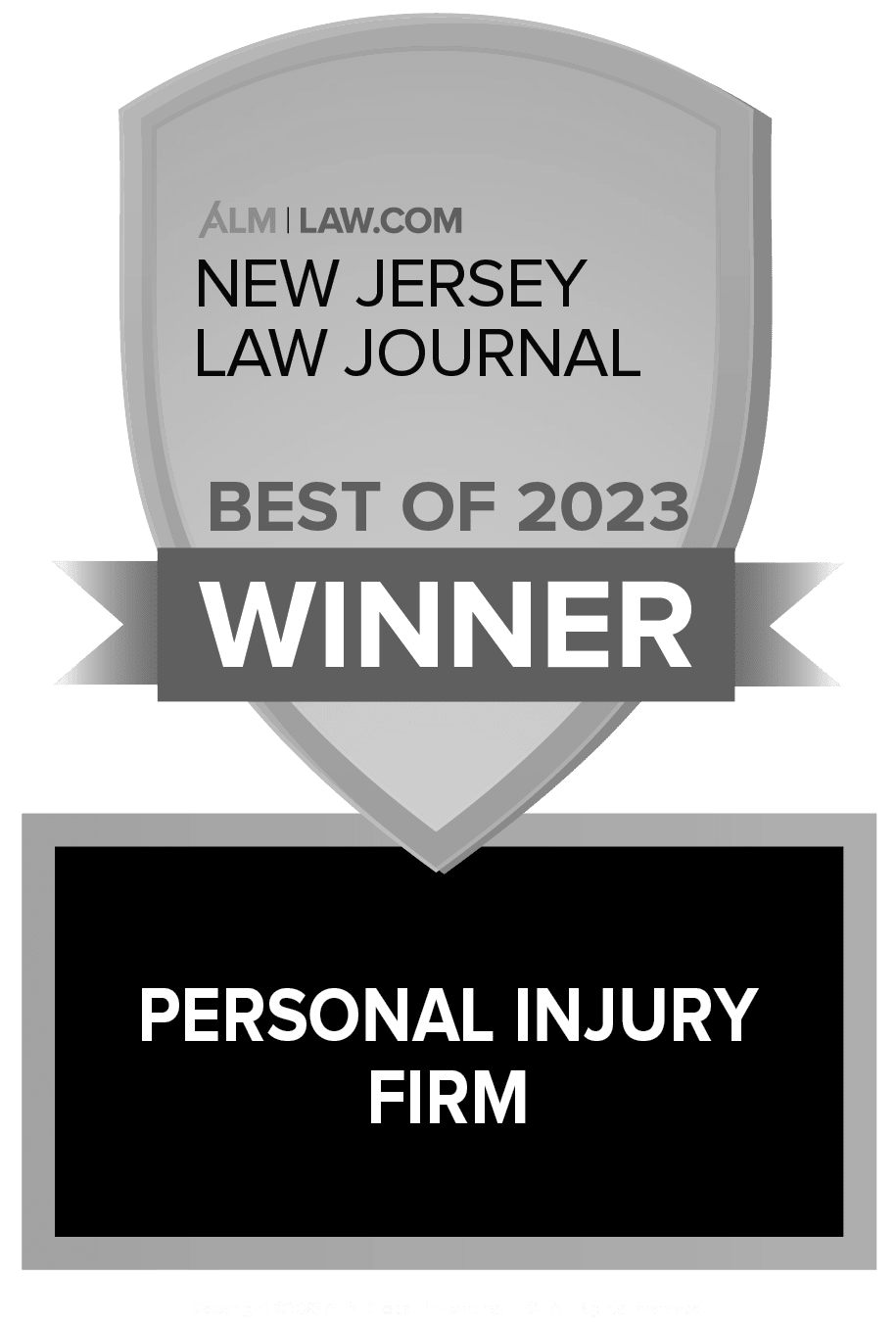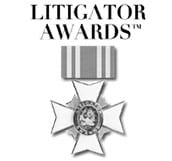Blume Forte Fall 2019 Newsletter
Greetings from New Jersey!
Our Successes in Personal Injury Litigation Span the State and Beyond!
FROM THE EDITOR
Welcome to the newest edition of the Blume Forte newsletter.
Our firm has worked for nearly a century to protect and help those injured as a result of medical and nursing home negligence, automobile accidents, unsafe products and premises, as well as workplace and construction site accidents.
In this newsletter you will see some of the results we have achieved that have helped our clients replace lost income, pay for past and future medical treatment and secure their families’ futures.
Since the inception of our firm, we have been advocates and pioneers striving to ensure
safer work conditions, homes, public places and improve health care for all those who
live in, work in or visit the Garden State.
Blume Forte: We are New Jersey. On behalf of all of our attorneys and dedicated support staff, thank you for your trust.
Jeffrey J. Zenna
RECOVERIES
$28,600,000 Medical Malpractice Verdict Obtained by Carol L. Forte and Connor C. Turpan
Our client, a 68-year-old woman, was admitted to Kessler Institute for Rehabilitation following spinal surgery. Two days later, she was injured while multiple rehabilitation assistants were attempting to transfer her from the toilet to her wheelchair. The transfer, which was not carried out safely by the Kessler employees, resulted in a fracture dislocation of her thoracic spine, which caused her to be paralyzed from the chest down.
Ken Elwood Secures $1,800,000 Settlement in Motor Vehicle Accident
A 47-year-old Sparta man who was traveling home with his wife in the early morning hours after visiting a friend struck an abandoned, disabled vehicle left sideways in the roadway. Minutes later, he was struck by a speeding vehicle operated by a police officer from the Department of Health and Human Services who claimed he did not see the man or the vehicle in the roadway. While the state claimed that the decedent was intoxicated and the accident was his fault, the matter settled during pretrial conferences; the State of New Jersey paid $I,700,000 and the insurance company of the operator of the disabled vehicle paid its $100,000 insurance policy.
Jeffrey Zenna Secures $825,000 Settlement in Motor Vehicle Accident
Our client, a 59-year-old man, was struck and injured by a truck while crossing a busy intersection in Jersey City, NJ. As a result of the impact, he sustained a head injury resulting in death. The accident was captured on surveillance video from a nearby store, which
demonstrated that the truck driver did not observe our client in the crosswalk prior to the accident.
John Molinari Wins $800,000+ Verdict in Trucking Accident
Our client’s car was rear-ended at a traffic light just off the New Jersey Turnpike in Elizabeth, NJ by a tractor trailer. While his medical history included a lumbar fusion approximately 15 years earlier, he had had no problems from that procedure up until the time of the collision. He had undergone a cervical fusion 4 months prior to the collision and had just been cleared to return to work on a part-time basis. After the crash, his lower back and neck were reinjured. The defense claimed that the minimal damage to the vehicle indicated that such an impact could never have caused anything more than sprains and strains. The offer made prior to trial was $400,000. After
5 days of trial in Middlesex County Superior Court, John Molinari secured a verdict of $761,500.00 that, with pre-judgment interest, totaled over $800,000.
RECOVERIES
Here is a sample of other results we have obtained for clients since our last issue.
$6,000,000
Medical Malpractice
Carol L. Forte
$2,600,000
Medical Malpractice
Carol L. Forte
$1,300,000
Motor Vehicle Accident
Kenneth W. Elwood
$1,250,000
Product Liability/
Motor Vehicle Accident
Harris S. Feldman
$1,200,000
Medical Malpractice
David M. Fried
$1,200,000
Medical Malpractice
Michael B. Zerres
$1,190,000
Trucking Accident
David M. Fried
$950,000
Product Liability
Harris S. Feldman
$875,000
Medical Malpractice
Mitchell J. Makowicz, Jr.
$650,000
Premises Liability
John E. Molinari
$650,000
Product Liability
Harris S. Feldman
$600,000
Premises Liability
John E. Molinari
$500,000
Premises Liability
John E. Molinari
$500,000
Medical Malpractice
Jeffrey J. Zenna
$415,000
Motor Vehicle Accident
Mitchell J. Makowicz, Jr.
$415,000
Medical Malpractice
Richard J. Villanova
$375,000
Birth Injury
Jeffrey J. Zenna
$375,000
Medical Malpractice
Jeffrey J. Zenna
$340,000
Premises Liability
John E. Molinari
$300,000
Product Liability
Jeffrey J. Zenna
$300,000
Accidental Shooting
Jeffrey J. Zenna
$275,000
Premises Liability
Norberto A. Garcia
$250,000
Motor Vehicle Accident
John E. Molinari
$200,000
Premises Liability
Robert C. Sanfilippo
FYI: NURSING HOME NEGLECT
By Kenneth W. Elwood
New Jersey nursing home residents have special rights guaranteed by law. N.J.S.A.
30:13-1 sets forth an extensive list of nursing home responsibilities and a resident’s bill of rights. New Jersey law also requires nursing homes to comply with federal regulations, such as those imposed by Medicare. Any violation gives rise to a cause of action against the person or facility committing that violation.
There are approximately 369 nursing homes in the State of New Jersey. The types of cases that our firm has handled include injuries and death from falls, bedsores (also known as pressure ulcers), medication errors, improper use of physical or chemical
restraints, elopement, dehydration and nutrition deficiencies. These cases are often the direct result of violations of the patients’ rights under state and federal law.
If you suspect that a loved one or a friend suffered such neglect at the hands of a nursing home, the resident or his or her legally-appointed representative has the right to pursue legal remedies. He or she also should report such violations to the Office of the
Ombudsman for the Institutionalized Elderly by calling toll-free 877-582-6995. The Office of the Ombudsman is duty-bound to investigate the complaint. Violations of a nursing home resident’s rights are serious and give rise to legal liability, including claims
for attorneys’ fees, costs and potentially punitive damages.
ACHIEVEMENTS, ANNOUNCEMENTS & EVENTS
11 Blume Forte Attorneys Honored as Super Lawyers; 2 Blume Forte Attorneys Named to Rising Stars List
Twelve Blume Forte attorneys have been named to the 2019 New Jersey Super
Lawyers list, a designation awarded to just 5 percent of the lawyers in the entire state.
This research-driven, peer-influenced rating system identifies attorneys who
consistently hold themselves to the highest professional standards.
The following Blume Forte attorneys were recognized again in 2019 for their work
in Personal Injury (the number of years next to their name indicates the number of
consecutive years they have received the honor):
David M. Fried (15 years)
Carol L. Forte (15 years)
Michael B. Zerres (15 years)
John E. Molinari (15 years)
Kenneth W. Elwood (15 years)
Mitchell J. Makowicz (15 years)
Jeffrey J. Zenna (8 years)
Cynthia M. Craig (14 years)
Brian E. Mahoney (7 years)
Norberto A. Garcia (12 years)
Ronald P. Goldfaden (15 years)
Carol L. Forte was recognized by Super Lawyers in its top ten list as the Number One Attorney in the state of New Jersey.
Blume Forte was also represented in the “Rising Stars” list, a designation given to less than 2.5 percent of New Jersey attorneys who are 40 years old or younger and who have been practicing for 10 years or less:
Alexa C. Salcito (1 year)
Robert C. Sanfilippo (8 years)
Super Lawyers, a Thomson Reuters business, is a rating service of outstanding lawyers from more than 70 practice areas who have attained a high degree of peer recognition and professional achievement. The annual selections are made using a patented multiphase process that includes a statewide survey of lawyers, an independent research evaluation of candidates and peer reviews by practice area. The result is a credible, comprehensive and diverse listing of exceptional attorneys. For more information about Super Lawyers, visit SuperLawyers.com.
FYI: A HIGHER BAR TO CLAIMS AGAINST EMPLOYERS AND COWORKERS
By Harris S. Feldman
We are routinely asked to look at cases involving injuries that happen at work. One hurdle we face in such cases is an immunity known as the “worker’s compensation bar.”
The workers’ compensation system has been described by our Supreme Court as a “historic ‘trade-off’ whereby employees give up their right to pursue traditional
lawsuits in exchange for prompt and automatic entitlement to benefits for work-related injuries.”1 What that means to litigants in a New Jersey personal injury case is that workers receive easily obtainable medical coverage and, for work-related injuries,
limited recovery for permanent injuries in exchange for giving up the right to sue an employer or coworker who is responsible for the injury. New Jersey courts strongly favor this system, which covers a wide range of injuries that are “part and parcel of
everyday industrial life.”2
Not all work-related claims are subject to the employer immunity. Injuries caused by intentional conduct, such as removing safety guards meant to protect the kind of injury which occurred, may not be protected from suit by the worker’s compensation bar.
Conduct that could be described as certain to cause injury will not be protected by the bar.3
When a worker’s injuries have been caused by that type of employer’s “intentional wrong,” that “intentional wrong” may void the “trade-off” and the employee may seek workers’ compensation benefits and common-law remedies against the employer.4
For decades, our courts applied the “substantial certainty” standard involving claims against employers. However, the New Jersey Supreme Court in Van Dunk v. Reckson Associates Realty Corp. recently made it harder to meet that standard, but still left the door open to some claims. The new test focuses on both the employer’s conduct and the context within which the negligence occurred.5
As the court in Van Dunk explained:
[W]hen assessing claims of intentional wrong, the court engages in a two-step analysis. First, a court considers the “conduct prong,” examining the employer’s conduct in the
setting of the particular case. Second, a court analyzes the “context prong,” considering whether “the resulting injury or disease, and the circumstances in which it is inflicted on the worker, [may] fairly be viewed as a fact of life of industrial employment,” or whether it is “plainly beyond anything the legislature could have contemplated as entitling the
employee to recover only under the Compensation Act.6
When it analyzed the level of danger to workers necessary to satisfy the conduct prong, the Supreme Court held that the employer’s conduct must now be “virtually certain” to cause injury.7 As the court explained, “An intentional wrong must amount to a virtual certainty that bodily injury or death will result.”8 Most importantly, “A probability, or knowledge that such injury or death ‘could’ result, is insufficient.”9
Examples of cases where a worker could defeat employer immunity include claims that “involve the employer’s affirmative action to remove a safety device from a machine, multiple prior OSHA citations at the same site, deliberate deceit regarding the condition of the workplace, machine, or the employee’s medical condition, knowledge of prior injury or accidents, and previous complaints from employees.”10 Today, marshalling the right facts to support such a claim is more important than ever.
To defeat an employer’s immunity today, a party must present evidence of conduct which is virtually certain to cause harm and proof that the context in which this conduct occurred created an environment that is not a normal consequence of industrial
life and is beyond what a regular worker would experience in a regular industrial setting. Plaintiffs seeking to overcome the strong preference for compensation as the sole remedy for workplace injury must conduct a detailed investigation.
We must not only know the facts of a case but also have a thorough understanding of a particular work setting to be able to explain to a judge how an injury and event were not a normal consequence of that setting.
1 Laidlow v. Hariton Mach. Co., Inc., 170 N.J. 602, 605 (2002).
2 Van Dunk v. Reckson Associates Realty Corp., 210 N.J. 449, 461 (2012).
3 Van Dunk 210 N.J. at 470.
4 N.J.S.A. 34:15-8. Charles Beseler Co. v. O’Gorman & Young, Inc., 188 N.J. 542, 546 (2006).
5 Van Dunk v. Reckson Associates Realty Corp., 210 N.J. 449, 461 (2012).
6 Van Dunk v. Reckson Associates Realty Corp., 210 N.J. 449, 461 (2012).
7 Van Dunk 210 N.J. at 470.
8 Ibid.
9 Id. at 470.
10 Van Dunk v. Reckson Associates Realty Corp., 210 N.J. 449, 471 (2012).
FYI: PRODUCT LIABILITY — COMPENSATION AND SAFETY
By Mitchell J. Makowicz, Jr.
Each and every day, people use many consumer products to carry out their daily activities of living. Some are quite simple, but others — such as automobiles — are complex engineering marvels. Given our constant reliance on these products, it is incumbent upon manufacturers and distributors of products to design and manufacture them in such a way that they are safe to use.
While the immediate goal of a product liability claim is to compensate someone who has been injured, there is another benefit that perhaps is less apparent: safer products. That was the intent of the California Supreme Court when it ruled in 1963 that manufacturers and distributors were liable if the products they made were “defective” — that is, unreasonably unsafe for their known and anticipated uses. An example of this principle in action is the automobile, a product that most people use on a daily basis.
Before he gained fame as a presidential candidate, Ralph Nader was an attorney and consumer advocate who focused his attention on the dangers posed by faulty and dangerous automotive designs. His landmark book, “Unsafe At Any Speed,” took the automotive industry to task for refusing to integrate a simple safety feature that is now taken for granted: the seatbelt.
Studies from the National Highway Safety Administration as early as 1972 demonstrated that many lives have been saved by the introduction of seatbelts as standard equipment in cars. As additional features have been designed and introduced — frontend airbags, side-curtain airbags, heads-up displays, automatic emergency braking, blind spot detection and rear-view cameras, to name but a few — each has enhanced the safety of everyone who drives or rides in a car.
It is well known to car manufacturers that, despite all of these safety features, accidents can and will happen. For this reason, manufacturers must also design their cars in a way that will lessen or eliminate the risk of serious injury to occupants. Sometimes,
either due to a flaw in design or a failure in the manufacturing process of the component parts, cars do not appropriately protect the occupants.
Because cars commonly travel at high rates of speed and sudden deceleration can result in serious traumatic injuries, car manufacturers are obligated to perform extensive design and failure testing to ensure that their cars will protect occupants in accidents.
When a car’s safety features fail to prevent a serious injury in an accident, or when it lacks protections, a potential source of compensation may be the manufacturer and distributor of the car. At Blume Forte, we have the knowledge, experience and
resources to effectively investigate any potential claim due to product defects in cars and other consumer products.
WHAT DOES IT MEAN TO BE A CERTIFIED CIVIL TRIAL ATTORNEY?
The Supreme Court of New Jersey created a special designation to identify attorneys who have a demonstrated level of competence in a particular area of law. There are five areas of designation in our state: civil trial law, criminal trial law, matrimonial law, municipal court law, and workers’ compensation law.
To be designated a “Certified Civil Trial Attorney in New Jersey,” an attorney must:
• be a member of the New Jersey Bar in good standing for at least five years
• have taken a specific number of continuing legal education courses
• demonstrate substantial involvement in the preparation of litigated matters
• demonstrate an unblemished reputation by submitting a list of attorneys and judges who will attest to their character and ability, and
• pass a written examination covering various aspects of practice in the designated specialty
Less than 3% of all New Jersey attorneys carry the “Certified” designation.
Over half of Blume Forte attorneys – and all of our partners – carry the “Certified” designation.
ACHIEVEMENTS, ANNOUNCEMENTS & EVENTS
Our attorneys maintain active involvement in many associations and professional organizations and are often recognized for their experience and successes.
- Carol L. Forte co-chaired the Medical Malpractice section of the New Jersey Association for Justice Meadowlands seminar
- John E. Molinari served as a judge for the Hudson County High School Mock Trial Competition
- John E. Molinari spoke at the 2019 Winter Seminar of the New Jersey Association for Justice, presenting “Trial Tips in Snow/Ice Cases”
- Richard J. Villanova will be speaking at a seminar in June for the New Jersey State Bar Association, “Preparing and Presenting the Auto Injury Case”
- Jeffrey J. Zenna was admitted to the New York Bar Association
- Jeffrey J. Zenna served as a supervising attorney investigator for the New Jersey Supreme Court District Attorney Ethics Committee
- Harris S. Feldman was named to the Top 10 list of the Trucking Trial Lawyers Association of America
- Carol L. Forte and Jeffrey J. Zenna were recently admitted to practice before the Supreme Court of the United States
Jeff Zenna, third from left, and Carol Forte, second from right, stand with colleagues who were admitted with them to practice before the United States Supreme Court
ACHIEVEMENTS, ANNOUNCEMENTS & EVENTS
The firm hosted a networking and educational breakfast at Forsgate Country Club: The Clock is Ticking: Notice Requirements, Statutes of Limitation and Immunities in New Jersey and Common Ethical Issues.
The event offered an overview of what every attorney needs to know about notice
requirements, immunities and statutes of limitation that apply in New Jersey, as well
as common associated ethical issues.
- This CLE event featured speakers Mitchell J. Makowicz, Jr. from Blume Forte (right) with special guest speaker Andrew B. Kushner of Andrew B. Kushner, LLC
- Mitch Makowicz reviewed statutes of limitation, notice provisions and immunities
- Guest speaker Andy Kushner discussed ethics issues
- David Fried offered helpful input from the floor
COMMUNITY
- The firm supported the 2019 Seaside Heights Polar Bear Plunge, which raised almost $7,000 for Special Olympics New Jersey.
- Blume Forte continued its support of the McNany Charitable Foundation, a local organization that supports a variety of community endeavors: scholarship programs, youth athletic sponsorships, public safety and welfare efforts, and several other efforts assisting those in the local community.
- Blume Forte celebrated another year of its employee student scholarship fund, and also established a $1500 scholarship for current and aspiring college students that love their dogs. Photos of the applicants and their pups will be posted on Facebook weekly.
FYI: PREMISES LIABILITY CLAIMS
By Richard J. Villanova
Premises liability cases are those that are based upon unsafe conditions of property. Trips and falls and dog bites are types of premises liability claims. New Jersey has adopted a traditional law approach to these types of claims. Your status on a person’s property will determine whether the property owner has any obligation to you and, if so, what.
There are three categories of visitors on a property: business invitee, licensee and trespasser. The property owner’s obligations are different depending on your status.
- A business invitee is entitled to the highest standard of care. For example, anytime you go to a store, even if you do not buy anything, you are a business invitee and the owner of the property is required to keep the premises safe and free of defects or obstructions. The owner must make reasonable repairs of any dangerous conditions as well as warn visitors of any dangerous hidden conditions. A business invitee is afforded the highest degree of care since the owner is potentially receiving a monetary gain from the visitor’s presence on the property.
- Licensees are those who are legally on the property of another. Social guests are a type of licensee. While a property owner is required to keep the property safe, the owner is not obligated to inspect the property looking for dangerous conditions. However, they must warn the guest of dangerous conditions known to them that would not otherwise be known to the guest.
- Trespassers are those for whom the law provides the least protection. Since a trespasser is not legally on a property, an owner is only liable to a trespasser if he or she intentionally or recklessly causes him or her harm.
An owner may be liable for the condition of property to one person but not be responsible to another for the same condition depending on the party’s status on the property.
The above standards may also differ depending on the age of the injured party. For example, children who trespass on a property are owed a greater duty by the landowner if the trespassing is reasonably foreseeable, the owner has reason to know of the danger and that the danger would likely attract children to it.
We are here for any questions you have, or if you would like to discuss a specific instance of suspected premises liability.
WELCOME
Blume Forte welcomes our newest attorneys.
Norberto A. Garcia returns as a partner to the firm. He previously spent 17 years at Blume before leaving in 2010 to start his own practice in Jersey City. He is the incoming president of the New Jersey State Bar Foundation. He is a trustee of the New Jersey State Bar Association, where he is also co-chair of the diversity committee and on the executive committee of the Civil Trial section. Norberto is a graduate of the University of Pennsylvania Law School. He has been certified as a civil trial attorney since 2001. He is a past president of the Hudson County Bar Association and the North Hudson Lawyers Club, and co-chair of the Hudson County Civil Practice Committee.
Norberto lectures regularly for various bar and professional associations and law schools and has written articles for the New Jersey Lawyer Magazine, the New Jersey Law Journal and New Jersey Biz Magazine.
He has had multiple 6 and 7 figure verdicts throughout a career that includes 100 jury trials to verdict. His recent settlements include a $450,000 dram shop case, a $625,000 auto accident case and a $2,100,000 trucking accident case. He has also appeared regularly before the appellate division of the New Jersey Superior Court.
Norberto grew up in Hudson County and currently resides in Morris County. He is fluent in Spanish.
Ashley A. Smith joined the firm in 2018. Her practice is focused on all areas of personal injury litigation and medical malpractice. Ashley is a graduate of Amherst College and New York University School of Law. At NYU, Ashley served as an executive editor for the Journal of Legislation and Public Policy and participated in the school’s rigorous year-long Civil Rights Clinic, helping to represent individuals in a federal lawsuit arising out of their unlawful arrests and detention.
Prior to joining Blume Forte, Ashley worked for a firm in central New Jersey where she litigated numerous personal injury, medical malpractice, employment law, and class action matters, regularly appearing in courts all over the state. In addition to being
regarded by her peers as a superb writer, Ashley is a skilled public speaker who has served as a coach for The Dale Carnegie Course in New York City. Ashley brings to the firm broad, in-depth knowledge and experience in civil litigation. Ashley is admitted
to practice in the State of New Jersey, the U.S. District Court for the District of New Jersey and the State of New York.
At a recent proof hearing in Union County, Ashley obtained an award of $275,000 for a client who suffered complications following an improperly performed spinal surgery. This fall, she will be participating in the Heart Walk for the American Heart Association.













